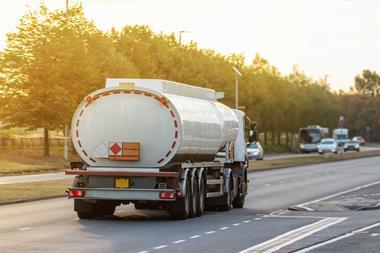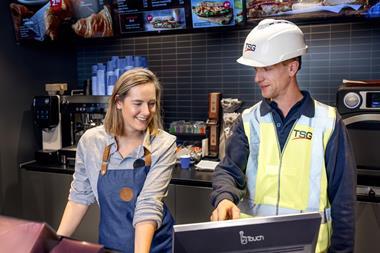The introduction of a new fuel with a higher ethanol content E10 has been delayed. Specification for the new fuel had been tipped to be signed off for introduction into the UK by the end of this year, but last month the government signalled that its position on E10 had changed.
In a letter to industry associations last month, Minister for Transport Norman Baker urged suppliers and retailers to postpone any plans to roll out the new fuel, citing concerns over vehicle compatibility and cost to motorists. While acknowledging that the introduction of E10 is a commercial matter, the government does not believe that now is the right time to introduce the new fuel, says Teresa Sayers, chief executive of the Downstream Fuel Association (DFA), (known as AUKOI until a rebrand two years ago) whose members, including distributors and supermarket retailers, sell almost 50% of the road fuels sold in the UK: "The main reasons behind this are compatibility of the car pool with some 20% of current cars and small vans believed to be incompatible and the cost to motorists, particularly those on low incomes who may be forced to use the more expensive super unleaded if their cars are not compatible," says Sayers. "Suppliers and retailers are currently reflecting on the letter but it will, without doubt, have implications on their decision about when to bring E10 into the UK fuels market."
For many, the move has been a welcome relief. Ramsay MacDonald, director of retail at GB Oils, supports the view that a rushed introduction will do more harm than good and is strongly urging the government to intervene and delay the introduction of E10. "GB Oils has the infrastructure and resources to rollout E10 in line with government guidelines, but we see that by introducing this product now, and in an ad hoc way, there is potential for reputational damage to all parts of the industry," he says.
"It will also put undue and unnecessary pressure on forecourt staff and end-user customers. We believe that the rollout should be delayed until the effects are minimised on the UK car pool and our views have been made known through the DFA."
Undoubtedly the experience of the introduction of E10 in Germany has unsettled the UK industry. "We have been particularly alarmed that in Germany a country with strong green credentials lack of information resulted in a motorist backlash and some forecourts, having allocated tankage to E10, were unable to meet the ongoing demand for standard fuels," says MacDonald. "A co-ordinated rollout driven by government, in concert with the oil industry and car manufacturers, is necessary to educate motorists and ensure that the cost implications for incompatible vehicles are properly understood and managed.
"GB Oils owes a duty of care to its dealers and more generally the UK’s independents, and the proposed arrangement is not a practical solution for them. Many retail dealers already struggle to make ends meet and putting additional pressure upon them, both financially and as judge and jury on a vehicle’s compatibility, is unreasonable. An estimated 700,000 vehicles here are expected to be affected and the recommended and more costly fuel alternative super unleaded is not readily available on around 40% of the UK’s independently-owned forecourts."
But the writing is not yet on the wall for E10. As Nick Vandervell, communications director of UKPIA, says: "The government has recently indicated that they would prefer to see delayed introduction of E10 to ensure that a very high proportion of newer E10 compatible vehicles are on the UK’s roads; nevertheless, the Renewable Energy Directive as implemented into the Renewable Transport Fuel Obligation (RTFO) still requires a 10% by energy biofuel content in road fuels by 2020. Whatever the timing, a very detailed public communication programme is envisaged to ensure motorists have clear advice in advance of any change."
Organisations like UKPIA, DFA and the Petrol Retailers’ Association have been working hard to ensure that any rollout of E10 will be smooth for suppliers, retailers and motorists. The DFA’s Teresa Sayers says: "The industry is pulling together to consider all the relevant questions the consumer will want answered so that we have a consistent, clear message to roll out to the consumer. We are keen to understand any challenges E10 may represent in terms of compatibility, infrastructure, handling and storage and are working with the Energy Institute for some definitive guideance on storage, particularly around corrosion issues for pumps, seals and tanks etc.
"We are also keen from a consumer perspective that they understand the limitations of E10," adds Sayers. "If E10 is sold it will have to be clearly labelled and differentiated from other fuels on the forecourt so consumers understand what they are putting in their cars. It’s quite realistic to compare this to the last major change in fuels when unleaded was introduced into the UK. We can learn from how that was dealt with."
Fuels development
An enormous amount of work has been undertaken by the downstream oil industry to ensure that the government’s targets are met under the RTFO. The target for biofuel content of road fuels is now 4% by 2011/12, rising to 5% by 2013/14. According to figures from HMRC in UKPIA’s Statistical Review 2012, in the 12 months of the 2010/11 obligation period, approximately 1,517 million litres of biofuel have been supplied to the UK market, of which 59% was biodiesel and 41% bioethanol. Provisional figures for 2011/12 show an increase in biofuels of around 3.7% of total road transport.
UKPIA’s Nick Vandervell says: "Current focus has been upon conventional biofuels derived largely from food crops. With concerns over indirect land use change associated with some biofuel sources, increased development focus is being made on fuels from a wider range of biomass and waste residues. However, these technologies present some challenges technically and logistically to produce the large volumes required for transport fuels. A great deal of research is also being made into fuel blending components derived from algae which may have particular relevance for diesel and jet fuel."
The Olympics and the Paralympics put biofuels firmly in the spotlight as BP, Official Oil and Gas Partner of London 2012, provided advanced fuels and lubricants for the official fleet of more than 5,000 vehicles. In addition to BP’s latest generation Ultimate petrol and diesel fuels being used to fuel the majority of the London 2012 fleet, the oil company demonstrated three advanced biofuels for the first time at its forecourt in Hammersmith, West London. These advanced biofuel blends were specially produced to be trialled in around 100 vehicles of the Games’ fleet.
Philip New, chief executive officer of BP Biofuels, says: "These breakthrough technologies will redefine biofuels. By incorporating them in the fuels for London 2012 we have taken the next generation of biofuels from the laboratory to the road."
The three biofuels are cellulosic ethanol, sugar-to-diesel and biobutanol. Cellulosic ethanol is a liquid fuel made by micro-organisms that break down the fibrous part of plants and then ferments them to produce ethanol. Blended with BP Ultimate unleaded petrol, BP says it creates a fuel with excellent sustainability credentials as well as an octane rating of 103, which will help to maximise the efficiency potential of future generations of petrol engines.
Meanwhile, sugar-to-diesel comes from leading-edge technology that produces high yields of synthetic bio-oil from plant sugars. BP’s sugar-to-diesel technology is said to have the potential to deliver in excess of 60% carbon reduction compared to fossil fuels. A blend of sugar-to-diesel biofuel and BP Ultimate diesel was used to fuel a number of vehicles in the Olympics fleet.
Finally, biobutanol is made by advanced fermentation of plant sugars using a special micro-organism. Once fermented and distilled, biobutanol can be blended with gasoline at higher concentrations than ethanol. The result is high-energy biofuel offering excellent compatibility with modern gasoline engines, enabling motorists to use a higher proportion of fuel derived from renewable sources of lower carbon fuels.
Despite being one of the most advanced biofuels, biobutanol’s journey from the lab to the forecourt is well underway. A spokesman for BP says: "The biobutanol technology demonstration plant constructed by BP and DuPont in Hull will validate the new biobutanol process, allowing it to be deployed at full commercial scale in 2014/15. As processes similar to sugar-to-diesel have already been used in pharmaceutical products and food supplements for several years, BP believes it can improve upon these techniques to scale up production of bio-oils which can be converted to renewable biofuels at lower costs than other methods using photosynthetics.
"We hope to make this technology ready for commercialisation in five years. BP-owned Highlands Ethanol based in Highlands County, Florida, is planning to build commercial-scale cellulosic ethanol facilities in the US. Our intention is to be operating within the next three years, producing up to 36 million gallons of cellulosic ethanol a year."
The government has yet to commit to a future plan for biofuels beyond April 2014, leaving the industry somewhat on tenterhooks. As the DFA’s Teresa Sayers says: "That is not a long time frame we are desperately waiting for some clarity on the government’s position on biofuels. The DFA and other industry stakeholders have been lobbying for a long-term trajectory in terms of policy so the industry can align itself to future needs. Without that we’re virtually in the dark.
"If they’re suddenly going to ramp up targets, that’s going to require a significant investment and time for suppliers to respond. The longer the government leaves it, the harder it’s going to be for the industry to respond quickly."
Future fuels
Beyond biofuels, a ground-breaking project to ensure the UK is well-positioned for the commercial rollout of hydrogen fuel cell electric vehicles was launched by the government in January. The new programme UKH2Mobility will evaluate the potential for hydrogen as a fuel for ultra-low carbon vehicles in the UK before developing an action plan for an anticipated rollout to consumers in 2014/15.
The programme aims to analyse in detail the specific UK case for the introduction of hydrogen fuel cell electric vehicles as one of a number of solutions to decarbonise road transport and quantify the potential emissions benefits. It will review the investments required to commercialise the technology, including refuelling infrastructure; and identify what is required to make the UK a leading global player in hydrogen fuel cell electric vehicle manufacturing, thereby paving the way for economic opportunities to the UK, through the creation of new jobs and boosting of local economies.
Speaking at the launch of UKH2Mobility, business minister Mark Prisk said: "The UK is proving itself to be a key early market for ultra-low emission vehicles with growing numbers of electric and plug-in hybrids appearing on our roads. The government is supporting this market by investing £400m to support the development, demonstration and deployment of these vehicles.
"Hydrogen fuel cell electric vehicles are increasingly being recognised as one of the viable options as we move to a lower-carbon motoring future. They are highly efficient, can be fuelled in minutes, travel an equivalent range to a conventional combustion engine, and have zero tail-pipe emissions. This country has a number of world-class companies that are developing exciting technologies in both the hydrogen energy and automotive value chains, and it is vitally important that we identify what is required to make these cars a realistic proposition for UK consumers."
LPG update
A growing number of drivers are determined to reduce their running costs so those retailers prepared to explore the business opportunities by offering LPG are best placed to reap the rewards, according to Autogas Limited, the leading supplier of automotive LPG to UK forecourts.
More than 12,000 cars were converted to run on LPG last year, according to estimates from the UKLPG trade association, increasing the number of LPG-powered cars in the UK to around 165,000.
There are currently more than 1,400 LPG refuelling sites across the UK. LPG supplier Autogas has added another 25 LPG fuelling facilities this year, and the joint venture between Shell and Calor now has LPG refuelling installations on more than 215 forecourts across the country, including branded independent service stations.
Paul Oxford, business development manager of Autogas, said: "LPG is the most practical alternative fuel available in the UK. Not only this, but more and more customers expect forecourts to provide the full range of fuels and not just petrol and diesel, so it’s also becoming a necessity for many retailers to offer it.
"Primarily it’s the significantly lower fuel bills that most drivers find attractive but there’s the environmental angle, which is also a major benefit. For retailers it can offer a very attractive revenue stream, possibly representing up to 5% of the forecourt fuel volume.
"This makes it a serious proposition for those wanting to expand their customer offering."
For retailers considering adding LPG to their services, there are a number of factors to consider, not least the size of the site and which tanks would be best suited, but also the various health and safety factors, says Oxford.
"Each site offers unique opportunities depending on local circumstances. Those situated in major conurbations and on A-roads and busy arterial are best placed to offer LPG, but those located in rural locations can also offer a valuable service to their community."
Biofuel at Heathrow
Heathrow Airport taxi drivers can fill up their cabs at a revolutionary biodiesel filling station, which opened in September last year.
Advance Fuels, a growing, local fuel distributor, has created a fuel filtration process which brings the licensed taxi drivers at Heathrow a cleaner fuel in the form of Liquid Energy.
The fuel is an EN590 blended diesel with up to 7% biodiesel content. The biodiesel is sourced from Mabanaft, which continually ranks at the top of the Renewable Transport Fuel Obligation (RTFO) league tables for biofuel sustainability.
The fuel is super-filtered on site to remove impurities and contamination.
Premium fuels
GB Oils is launching a high-performance fuel within the next 12 months under the Endurance brand, which is currently only available as a super unleaded and high octane racing fuel for Gulf customers.
Ramsay MacDonald, GB Oils director of retail, says: "Four fuel products is the credible offer these days, with a strong demand among some motorists for a high-performance product offering fuel economies.The new Endurance products, including an enhanced cetane diesel, will be available to all GB Oils-supplied dealers across the UK, supported by innovative on-site branding and an assortment of communications for the motorist, as well as forecourt staff."
Petrol versus diesel
l Sales of petrol have fallen to 18.9 billion litres, or less than 43% of road transport demand by litres
l Average annual decline has doubled in the past six years to 4.7%, relative to the past 20 years of an average of 2.6%
l Diesel sales reached around 25 billion litres in 2011, representing 57% of road transport fuel demand by volume
l Diesel sales fell slightly due to the recession. Prior to 2008, diesel was replacing petrol on a like-for-like basis, with an average annual growth rate of 3% in the past 20 years, but has slowed down to 1.8% in average annual growth in the past six years.
Source: Department of Energy and Climate Change

































No comments yet